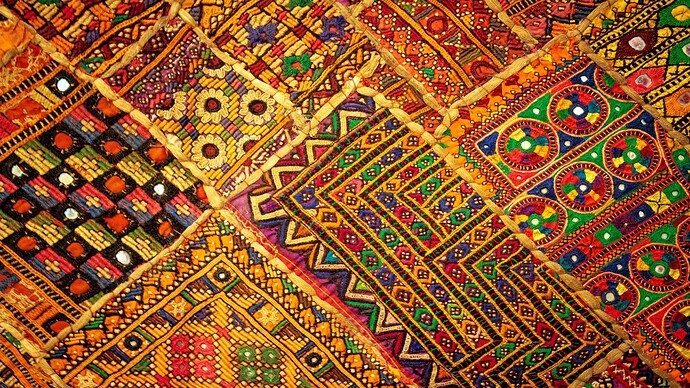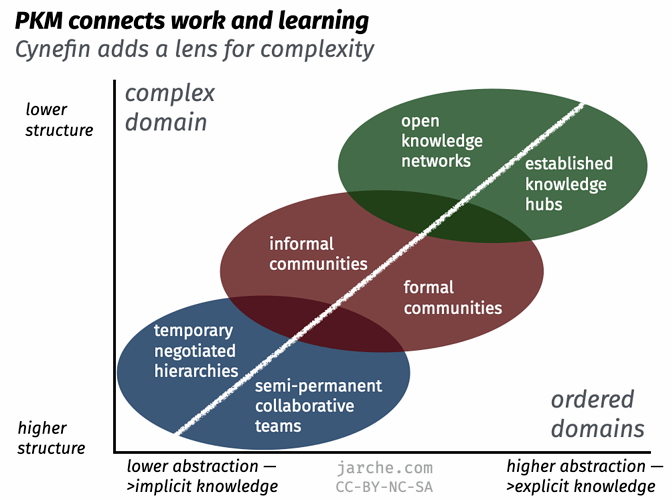Combining Fediverse and Wiki’s
In follow-up to discussion with Mike Hales, @bashrc and @bhaugen as well as Exploring semantic knowledge base solutions - Fediverse Futures - SocialHub some thoughts / brainstorm of what a wiki-like semantic knowledge base might offer that’d add value that existing tools don’t have. Just brainstorming and trying to stay away from the technical parts. Let’s imagine a federated app based on new concepts. called Semmy …
What Semmy offers is a: Social Knowledge Fabric
Semmy should be a best-of-both-worlds combination of what makes Wiki’s great, and the social fabric offered by the Fediverse:
- Wiki: Offers easy navigation through large bodies of information (hyperlinked content)
- Fediverse: Offers easy social interaction between large amounts of people (federated messages)
(note: that’d be ‘easy’ from an end-user perspective i.e. people and their communities)
Semmy should not compete with Wikipedia, one of the most successful online collaborative projects:
- Wikipedia: Is an online encyclopedia to document as accurately as possible common human knowledge.
- Semmy: I imagine this is a social knowledge representation tool. And I want to explore what that means.
Semmy has a number of characteristics:
- Personal: When I use the tool it represents my view of the world i.e. the stuff that I am most interested in.
- Collective: My social network of family, friends, acquaintances relate to who I am, and my personal interests.
- Collaborative: My worldview, my interests, my skills, my wisdom. They all evolve with help of others.
- Social: The more people meet and anticipate each other’s needs the richer their interaction and ‘yield’.
Semmy is used in the following way:
- As a personal tool that makes you part of a collective where you collaboratively deepen social bonds.
What you do with Semmy is ‘weaving information’ such that it adds value to your life and connects you to others.
Now I’ll look at some things I do, some needs I have, and problems I encounter …
- I like the concept of Learning in public. And it is a practice that might benefit others. Life-long learning. Teach and be taught.
- I practice “weaving in public”: making people aware of each other’s work and on topics that interest me. Encourage collab.
- I practice “dreamwalking”: pursuing impossible-seeming life goals, but I am content with just progress, Nothing more needed.
As to what I need to make these 3 ever ongoing activities easier:
- A way to keep track of the ‘fabric’ I’ve already woven, and all the areas where I want to weave some more.
- Ideally this should be connected to my life goals and aspirations, both short and long-term, and I’d like to see where I am with that.
The most prominent problems I encounter, the hurdles I need to overcome to ease my quest and make more progress:
- A gobsmacking amount of info overload. I walk a narrow “focus alley” collecting piles of “interest backlogs” along the way.
- A shattered attention span by all the stimulus thrown at me, that makes reflection and doing deep work harder and harder.
- A metric ton of wasted time and effort by endlessly copying information around from one channel to the next.
Lastly some observations on things I see around me …
- The info overload, attention issues, wasted time on menial tasks are universal. Everyone suffers this to certain extent.
- Numerous initiatives try to tackle this. Note-taking tools, knowledge bases, personal or shared, are popping up daily.
Hauling back to the first two bullets in this post, my feeling is that Wiki’s and Fediverse offer the perfect mix for supportive tools:
- That are able to scale and include large amounts of people.
- That are still able to be tailored to the needs of individuals.
- That can be seamlessly integrated in a large amount of channels.
- And that can be still intuitive to use on a day-by-day basis.
With all of the above from here I could drill down into more of a use case level. But I rather keep it higher-level for a bit …
- Knowledge should start ‘reaching out to me’ based on my activities and my social network.
- I can interact with the knowledge that ‘floats’ around other people in my network, and together we enrich it.
- Based on my interest for new knowledge I will find new friends that become part of my network.
- The tools themself don’t matter. They are selected based on personal preference.
As to delving into specific features and functionality it should be clear now that the concepts here open an endless space for all different kinds of tools to exist, and that can integrate and build on top of each other. Just like with the Fediverse in general (and I presume so too in the wiki world) it is the “substrate” that is below these apps that will be the enabler that unlocks all the potential.
So hence I won’t go into specific use cases, but leave it at this for now 
- Topic has been copied from Semmy: Social knowledge fabrics on SocialHub, where there’s some discussion relating to it.
- Topic can be related to Idea: Software projects as “Community Digital Gardens”
- Also see: Creating Social Knowledge Graphs by networking second brains via the Fediverse on SocialHub by Mathew Lowry.

 The other three unbolded points have a very good example –
The other three unbolded points have a very good example – 
